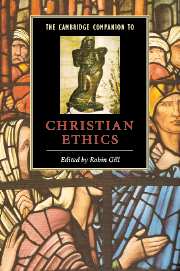Book contents
- Frontmatter
- Part I The grounds of Christian ethics
- Part II Approaches to Christian ethics
- 6 Natural law and Christian ethics
- 7 Virtue ethics
- 8 Gender and Christian ethics
- 9 Liberation ethics
- 10 Christian ethics
- 11 Other faiths and Christian ethics
- Part III Issues in Christian ethics
- Select bibliography
- Index
7 - Virtue ethics
from Part II - Approaches to Christian ethics
Published online by Cambridge University Press: 28 May 2006
- Frontmatter
- Part I The grounds of Christian ethics
- Part II Approaches to Christian ethics
- 6 Natural law and Christian ethics
- 7 Virtue ethics
- 8 Gender and Christian ethics
- 9 Liberation ethics
- 10 Christian ethics
- 11 Other faiths and Christian ethics
- Part III Issues in Christian ethics
- Select bibliography
- Index
Summary
A virtue is a trait of character or intellect which is in some way praiseworthy, admirable or desirable. When we refer to somebody's virtues, what we usually have in mind are relatively stable and effective dispositions to act in particular ways, as opposed to inclinations which are easily lost, or which do not consistently lead to corresponding kinds of action. And so, for example, someone who has the virtue of generosity will consistently respond in generous ways in a variety of situations, including those in which generosity is difficult or costly, in contrast to someone who is moved by pity to one uncharacteristically generous act, or someone whose generous impulses are frequently overcome by desires for self-indulgence. Today, the virtues are normally understood to be morally praiseworthy traits of character, but this has not always been the case; for example, many ancient and medieval writers considered intelligence and wit to be virtues.
- Type
- Chapter
- Information
- The Cambridge Companion to Christian Ethics , pp. 96 - 111Publisher: Cambridge University PressPrint publication year: 2000
- 1
- Cited by

